Words Amicia de Moubray Photographs Anthony Bliss, Sue East and Natalie Stapleton
A visit to Lynsted Community Kitchen Garden is a very happy-making experience. It is the essence of what being part of a community is all about.
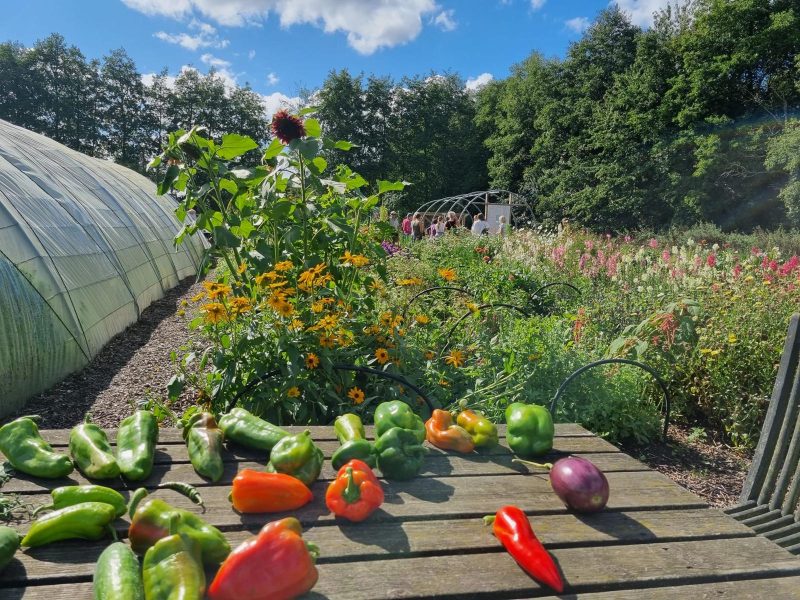
An arresting display of peppers with floriferous beds in the background brimming with flowers
Whilst grounded by lockdown, Vanessa Ross Russell had the idea of assembling a group of people to grow produce. ‘I leafletted scores of households in Teynham and Lynsted in December 2020 with a card saying: ‘Would you like to be part of a local community Kitchen Garden in Lynsted?’ Within 24 hours, 24 people had expressed an interest. By the end of the week 28 people had signed up. It was officially launched at the beginning of 2021.
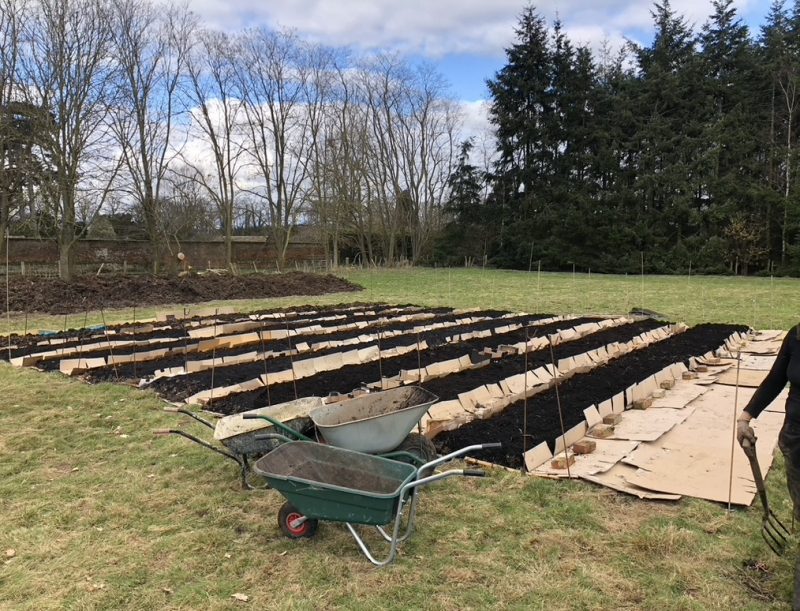
The first no-dig bed March 2021
Three years on, there are now 70 volunteers. The concept is that everyone does a bit of work and, in return, can harvest free produce. The volunteers have all levels of gardening experience – some a lot, some none. The one criterion is they must live within approximately six miles of Teynham. Members pay an optional £20 a year if they can – the fee is not enforced – and it is free for under-18s. 12 of the members are children. The money goes towards buying seeds and the running costs of the garden. ‘The idea is money should never be a barrier to joining. The truth is that in just three or four pickings, you’ll have got your money back.’
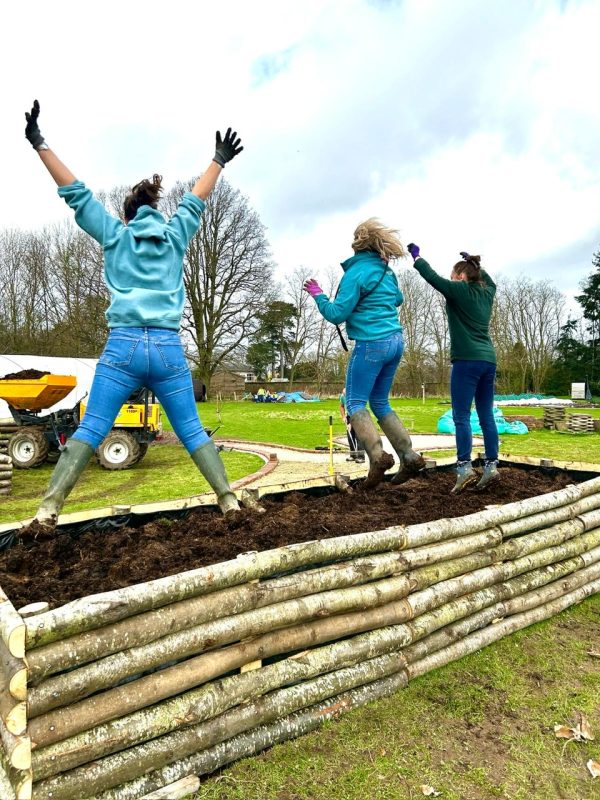
Raised beds
Vanessa, who teaches geography part-time at Simon Langton Girls School, is passionate about involving children. The management team includes two ‘Young Ambassadors’. ‘I believe that it is a real legacy to introduce them to the pleasures of growing and harvesting thereby empowering them. Having a range of ages makes it all the more enjoyable.’ 14-year-old ambassador Freya, describing the thrill of harvesting, says: ‘It makes you feel proud of yourself.’
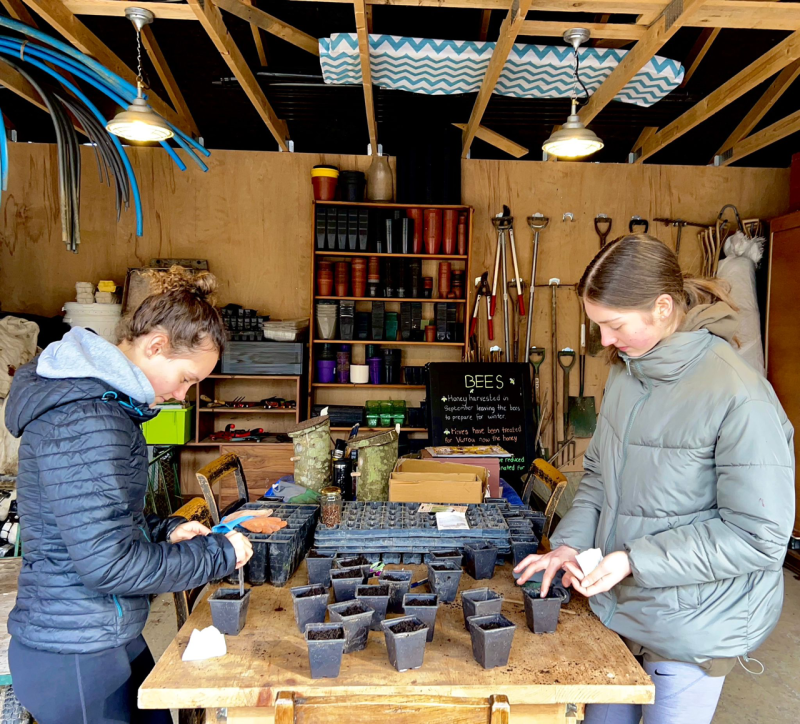
The Young Ambassadors sowing seeds
Vanessa explains how the idea arose: ‘I had grown vegetables for about 30 years.’ This statement conjures up a blissful bucolic image, but the reality is that it’s hard, often lonely work, very time consuming and expensive in the long run. ‘How much does a home-grown radish cost?’ she laughs.
She is a devotee of the Charles Dowding ‘No Dig’ method. Dowding swears that ‘no dig’ means fewer weeds and better moisture retention. ‘It all begins with the soil …. Nurture your soil to grow better veg with less effort,’ says Charles.
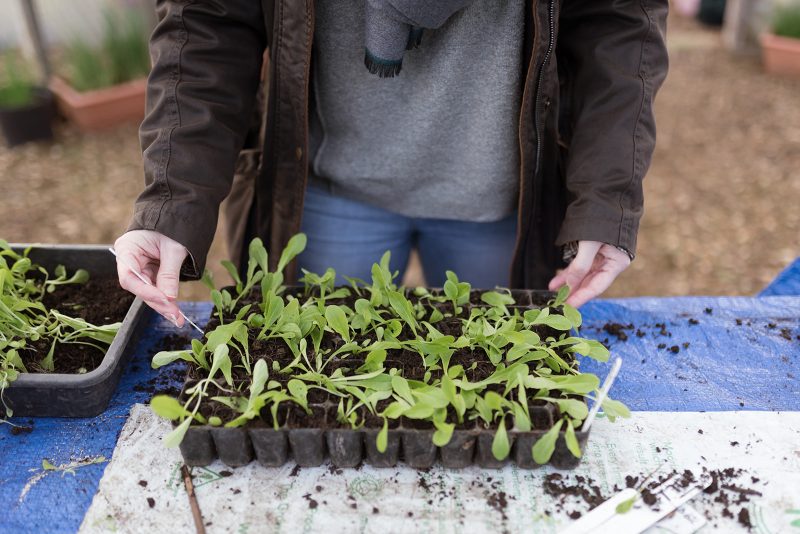
Potting on
Forget the strenuous toil of preparing a site by digging it over. Instead, the Dowding method is to lay down a light-excluding mulch (for example cardboard) and cover it with a layer of compost. This process feeds the earth with masses of soil life from the organic matter on the surface – replicating what happens in nature, where old leaves and woody materials are decay on the ground and are then dragged down into the earth by worms.
The site, in a huge field near Lynsted Park, was ‘knee deep in brambles and nettles.’ One of the many attractive aspects of the LKC is the feeling of openness and space that permeates the site.
It is extraordinarily impressive to see what has been achieved. Already, the project has won several awards including RHS/BBC Achievement Awards for community growing, and a Silver Wilder Kent award from the Kent Wildlife Trust. LCKG was invited by Bore Place to be part of the http://www.producedinkent.co.uks Good Food Movement strategy.
The produce is abundant whatever time of year. There are lots of overwintering crops and in the cooler months the polytunnel is brimming with winter lettuce, green mizuna, and lots of other salad leaves. In the summer there is a veritable cornucopia of produce including tomatoes, a large selection of herbs, cucumbers, melons, aubergines and chillies. ‘The kids love the soft fruit cage which is bursting with raspberries, strawberries, gooseberries and tayberries. Claire of @nettleandbloomuk grows flowers on the site.
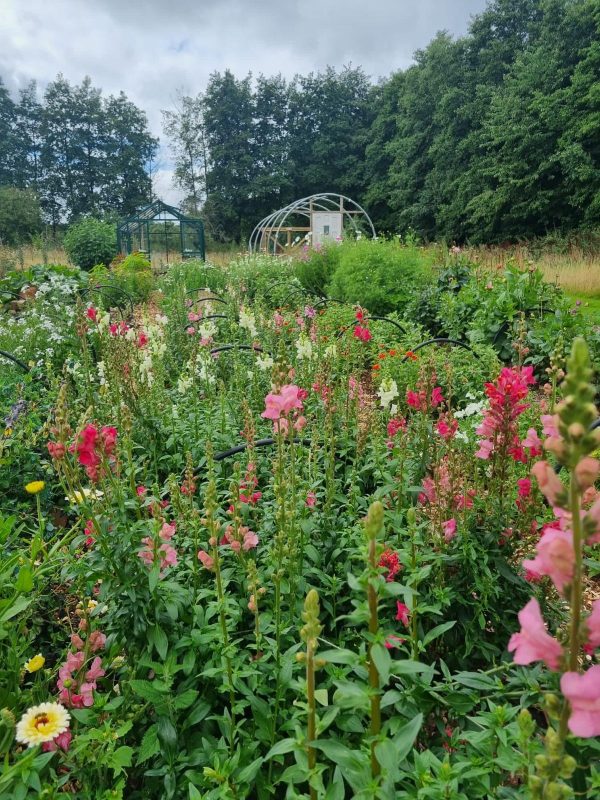
Claire’s flowers
‘I don’t buy fruit or vegetables from June to October,’ says Ray East. Everyone I met as I toured the garden was very excited by the honey extracted from the beehives. ‘It is the most prized thing, liquid gold,’ says Jacqui , the secretary, adding: ‘There is something very magical about the bee process.’
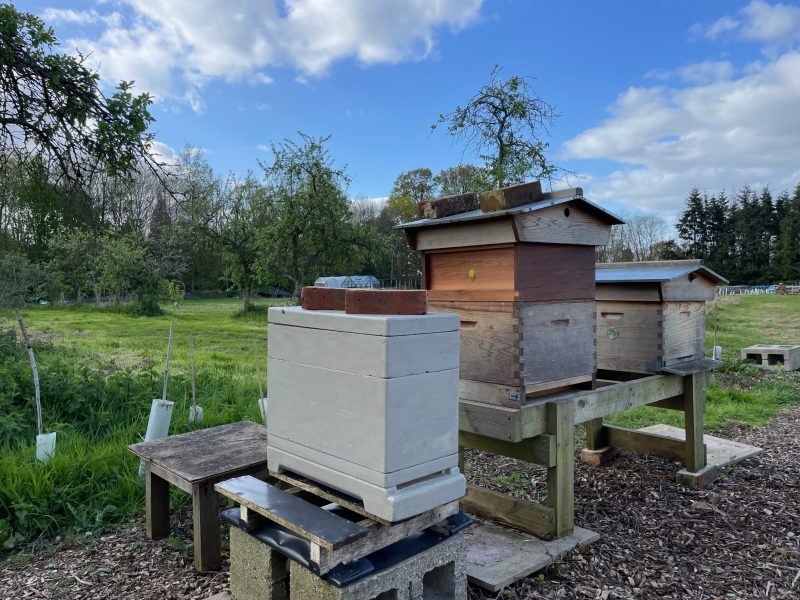
The beehives
LCKG is a lesson in recycling, sustainability, biodiversity, generosity, harvesting rainwater and ingenuity – for example, discarded old tennis nets held up by metal road pins successfully keep out rabbits from the beds of climbers, peas, beans and sweetcorn: ‘We grow these ‘tall crops’ in a block. Climbing plants won’t fit under our normal hoops (old water pipes).’
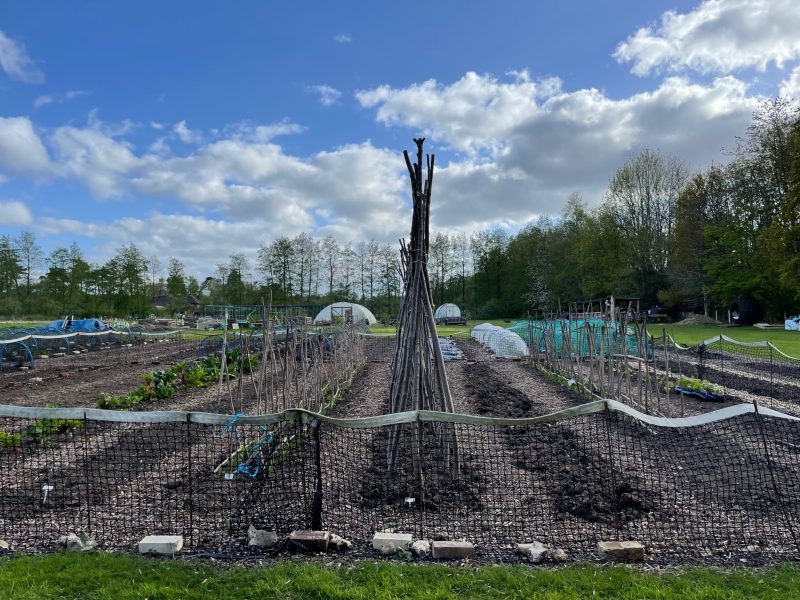
Old tennis court nets ingeniously used to keep rabbits away from the peas, beans and sweetcorn plants
Cardboard from old vegetable boxes from Sainsbury’s in Faversham and Lukehurst, the furniture shop in Sittingbourne, line the beds. The invaluable polytunnel was donated by a widow who had no use for it after her husband died. Dave Gurney, a tree surgeon and volunteer, donates hazel pea sticks and wood chip. Locally-grown timber from Torry Hill Chestnut Fencing in Doddington is used for making raised beds. The Woodland Trust has given 500-plus hedgerow whips. A generous supporter pays for the fuel for a minibus of children from Lynsted and Norton Primary School to come and help in the garden every Friday. At the outset, a donation of £2,000 worth of compost was crucial in setting up the garden.
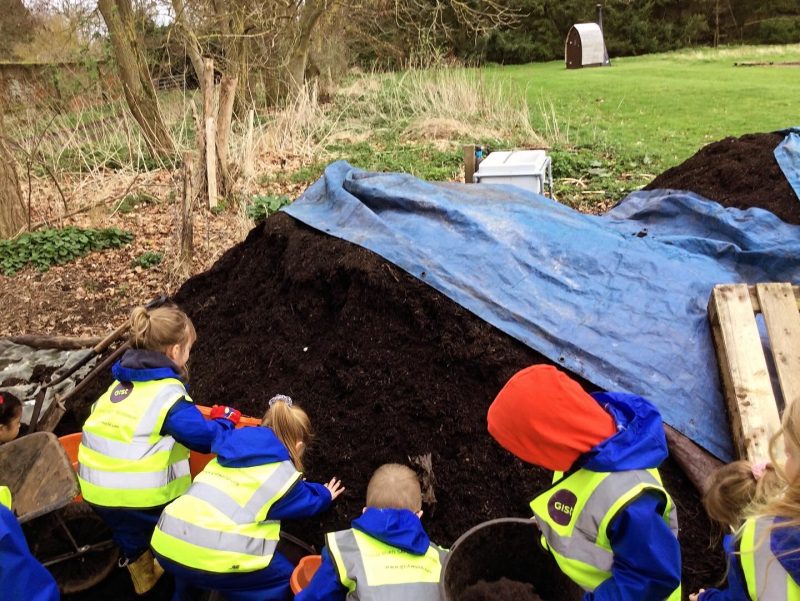
Pupils from Lynsted and Norton Primary School help regularly
It is also a lesson in humanity. Amongst the volunteers, there is an unspoken rule that no one swipes the last of each crop, for example there are always a few sweetcorn or a few lettuces languishing for someone else to take home. ‘Chatting and gossiping hold the group together.’ Vanessa has been surprised by how intimate some conversations can be but: ‘Everything stays in the veg patch.’
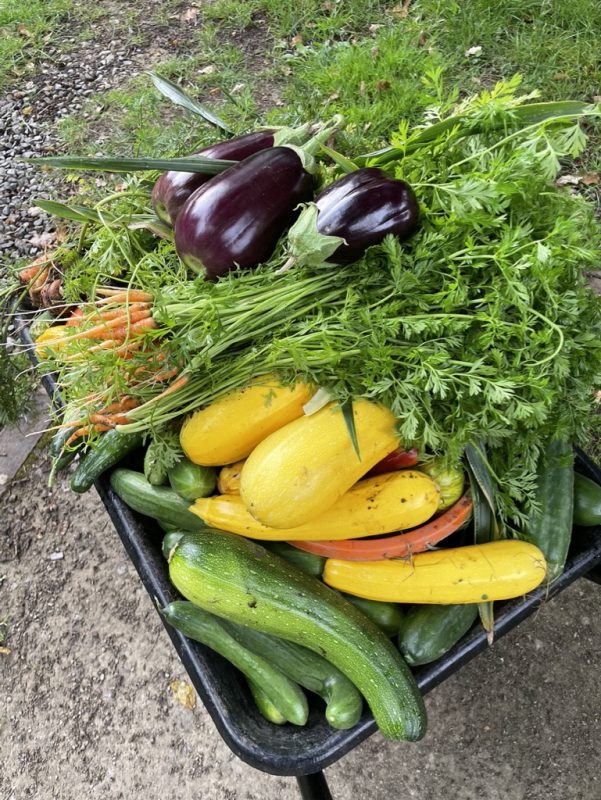
A wheelbarrow laden with bountiful produce
Two new projects underway are a wheelchair-accessible Herb Garden and Wellness area supported by a Bupa Foundation Green Community Grant and designed by Trevor Sharp of Sharp Garden Design. And the National Garden Scheme has just awarded a community grant towards creating a wildlife pond.
‘Everything is a learning game,’ says Vanessa, whose enthusiasm is infectious as is her dynamism. Our motto is ‘Do what you can.’
Free events in 2024
Saturday 1 June 6pm-7pm Wellbeing Herb Garden Opening
Sunday 7 July 11am-5pm open in aid of the National Garden Scheme
29 September 10.30am-12.30pm